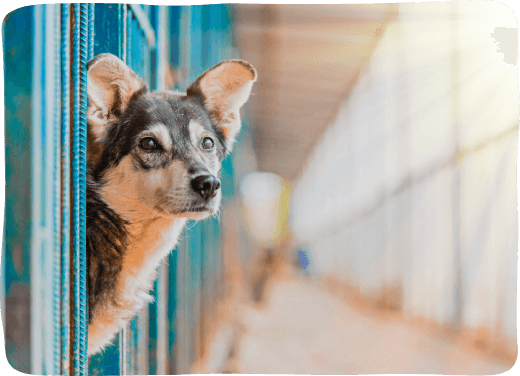

Our dedicated team of veterinarians, ecologists and social scientists, together with our passionate volunteers are driving change for Australia’s beloved companion animals. We do that by sharing evidence-based best practice with the people and organisations who can make a difference - including you!
Our dedicated team of veterinarians, ecologists and social scientists, together with our passionate volunteers are driving change for Australia’s beloved companion animals. We do that by sharing evidence-based best practice with the people and organisations who can make a difference - including you!
Our dedicated team of veterinarians, ecologists and social scientists, together with our passionate volunteers are driving change for Australia’s beloved companion animals. We do that by sharing evidence-based best practice with the people and organisations who can make a difference - including you!

Pet Lovers
How you can help change the lives of Australia’s favourite furry friends

Pounds and Shelters
What it will take to achieve zero euthanasia of healthy cats and dogs

Rescue Groups
Research shows domestic cats don't threaten native wildlife populations.

Councils
Lend your support to life-saving strategies and innovative interventions

Pet Lovers
How you can help change the lives of Australia’s favourite furry friends

Pounds and Shelters
What it will take to achieve zero euthanasia of healthy cats and dogs

Rescue Groups
Research shows domestic cats don't threaten native wildlife populations.

Councils
Lend your support to life-saving strategies and innovative interventions

Pet Lovers
How you can help change the lives of Australia’s favourite furry friends

Pounds and Shelters
What it will take to achieve zero euthanasia of healthy cats and dogs

Rescue Groups
Research shows domestic cats don't threaten native wildlife populations.

Councils
Lend your support to life-saving strategies and innovative interventions

Pet Lovers
How you can help change the lives of Australia’s favourite furry friends

Pounds and Shelters
What it will take to achieve zero euthanasia of healthy cats and dogs

Rescue Groups
Research shows domestic cats don't threaten native wildlife populations.

Councils
Lend your support to life-saving strategies and innovative interventions

Pet Lovers
How you can help change the lives of Australia’s favourite furry friends

Pounds and Shelters
What it will take to achieve zero euthanasia of healthy cats and dogs

Rescue Groups
Research shows domestic cats don't threaten native wildlife populations.

Councils
Lend your support to life-saving strategies and innovative interventions

Pet Lovers
How you can help change the lives of Australia’s favourite furry friends

Pounds and Shelters
What it will take to achieve zero euthanasia of healthy cats and dogs

Rescue Groups
Research shows domestic cats don't threaten native wildlife populations.

Councils
Lend your support to life-saving strategies and innovative interventions

Pet Lovers
How you can help change the lives of Australia’s favourite furry friends

Pounds and Shelters
What it will take to achieve zero euthanasia of healthy cats and dogs

Rescue Groups
Research shows domestic cats don't threaten native wildlife populations.

Councils
Lend your support to life-saving strategies and innovative interventions

Pet Lovers
How you can help change the lives of Australia’s favourite furry friends

Pounds and Shelters
What it will take to achieve zero euthanasia of healthy cats and dogs

Rescue Groups
Research shows domestic cats don't threaten native wildlife populations.

Councils
Lend your support to life-saving strategies and innovative interventions

Pet Lovers
How you can help change the lives of Australia’s favourite furry friends

Pounds and Shelters
What it will take to achieve zero euthanasia of healthy cats and dogs

Rescue Groups
Research shows domestic cats don't threaten native wildlife populations.

Councils
Lend your support to life-saving strategies and innovative interventions

Pet Lovers
How you can help change the lives of Australia’s favourite furry friends

Pounds and Shelters
What it will take to achieve zero euthanasia of healthy cats and dogs

Rescue Groups
Research shows domestic cats don't threaten native wildlife populations.

Councils
Lend your support to life-saving strategies and innovative interventions

Pet Lovers
How you can help change the lives of Australia’s favourite furry friends

Pounds and Shelters
What it will take to achieve zero euthanasia of healthy cats and dogs

Rescue Groups
Research shows domestic cats don't threaten native wildlife populations.

Councils
Lend your support to life-saving strategies and innovative interventions

Pet Lovers
How you can help change the lives of Australia’s favourite furry friends

Pounds and Shelters
What it will take to achieve zero euthanasia of healthy cats and dogs

Rescue Groups
Research shows domestic cats don't threaten native wildlife populations.

Councils
Lend your support to life-saving strategies and innovative interventions
Pet Lovers
From the choices we make with our own pets, to our willingness to advocate for change, we can all play a part in saving the lives of vulnerable animals and ensuring that many more get the loving home they deserve.






Pounds & Shelters
We know it’s possible to achieve zero euthanasia of adoptable and treatable dogs and cats - generally accepted as a live release rate of 90% or higher – but we need you to believe it too, and to commit to making it a reality.
Rescue Groups
Rescues do an incredible job saving lives and placing pets in loving homes, but with the benefit of best-practice guidance the outcomes could be even better. Your support is crucial in our quest to achieve zero euthanasia.






Councils
Through proactive policies and engagement across our communities, councils have an important part to play in tackling unnecessary pet euthanasia. Get to grips with the problem in your area and discover how to tackle it at its roots.
Subscribe to our newsletter!
© 2025 APWF · All rights reserved.
Subscribe to our newsletter!
© 2025 APWF · All rights reserved.
Subscribe to our newsletter!
© 2025 APWF · All rights reserved.
Subscribe to our newsletter!
© 2025 APWF · All rights reserved.
